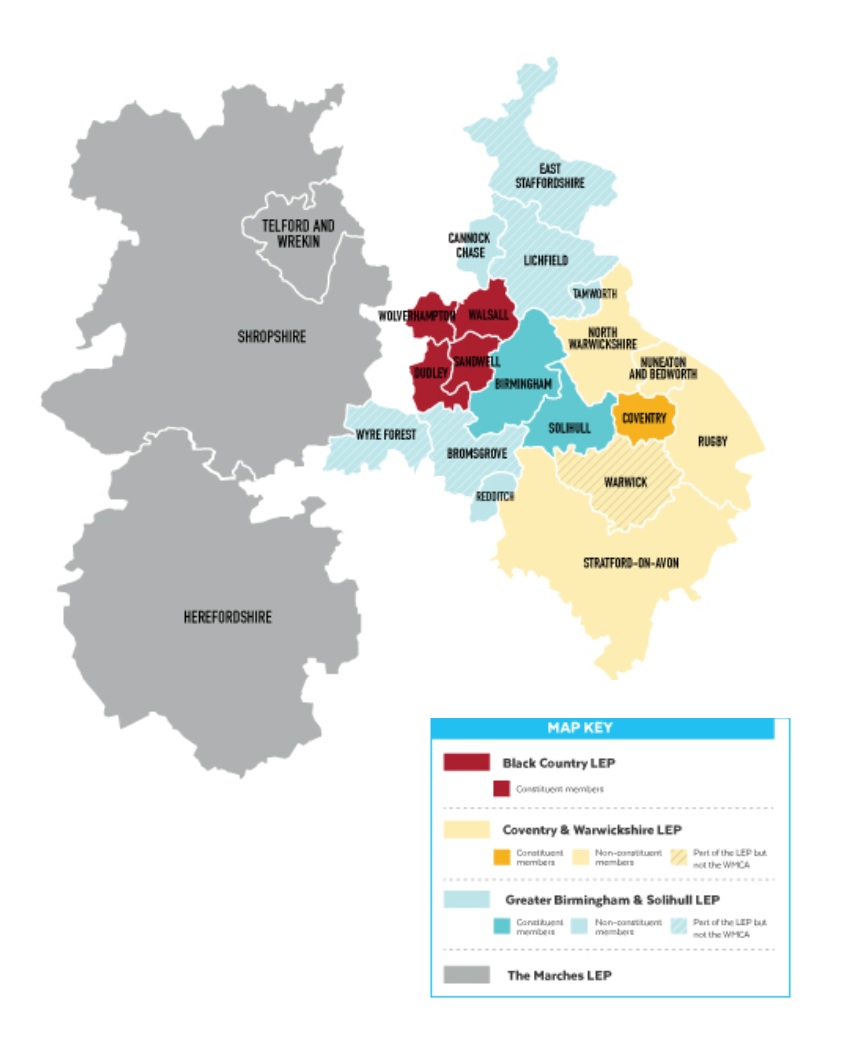Local Enterprise Partnerships face merger pressure

Exploratory talks about merging three West Midlands Local Enterprise Partnerships (LEPs) have been given added impetus after the Government set out its “encouragement” for LEPs to have the same geography as mayoral areas.
A Government white paper has demanded that LEPs across the country submit proposals on “geographies which best reflect real functional economic areas” which it expects will include suggested mergers.
It explicitly says it “will encourage Local Enterprise Partnerships and mayoral combined authorities to move towards coterminous boundaries where appropriate”.
Andy Street, who was chairman of Greater Birmingham and Solihull LEP for five years before being elected West Midlands mayor, has been in the United States this week but is understood to support the current structure and is not pushing for a merger.
Currently the area covered by the mayor and the West Midlands Combined Authority (WMCA) is served by three LEPs – Greater Birmingham and Solihull, Coventry and Warwickshire, and the Black Country.
The WMCA has seven constituent members – the councils of Birmingham, Coventry, Dudley, Sandwell, Solihull, Walsall and Wolverhampton – while 10 other councils are non-constituent members.
The LEPs also have responsibility for some areas that are not represented at the Combined Authority, including Lichfield, Bromsgrove and Warwick.

Map showing the West Midlands Combined Authority, Local Enterprise Partnership and council areas (Source: Black Country LEP)
The Government has set a deadline of September 28 this year for proposals to be submitted. It will then respond in the autumn.
LEPs were set up in 2011 in the aftermath of the Coalition Government’s bonfire of the quangos, as much-reduced replacements for the regional development agencies. They are designed to be partnerships between local authorities and business to push economic issues.
As the devolution agenda gathered momentum, it has been difficult at times to separate responsibilities as overlaps became inevitable. In the West Midlands, there are county councils, district councils, unitary authorities, the WMCA, LEPs, the West Midlands Growth Company and the Midlands Engine which all have some input and responsibility in key issues including inward investment, job creation and skills. Many of those bodies have representatives overseeing the activities of the other organisations.
The three LEPs in question have already been having conversations in expectation of Government pressure following its review of LEPs. However the local focus and responsiveness of the individual LEPs is seen as a key benefit.
Jonathan Browning, chair of the Coventry and Warwickshire Local Enterprise Partnership (CWLEP), said: “The LEP Review has been carried out with the intention of strengthening LEPs, an ambition we fully support. However, there does need to be greater clarity on some of the suggestions which, at first sight, do not appear necessary.
“For example, changing boundaries is not a priority for us here in Coventry and Warwickshire at this time. There are a great number of issues facing businesses at the moment and we should not waste unnecessary time and effort on matters which have no clear positive effect on people or growth.”
Tim Pile, chair of the Greater Birmingham & Solihull Local Enterprise Partnership (GBSLEP), confirmed discussions would continue “with all of our partners about the potential implications of these boundary changes” while the Black Country LEP said it had “nothing to add to the Government’s white paper at this time”.









